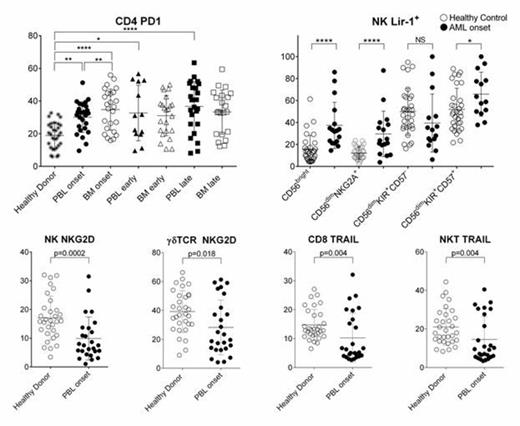Abstract
While chemotherapy is successful at inducing remission of acute myeloid leukemia (AML), the disease has a high probability of relapse. Immune-surveillance of AML and susceptibility of leukemia cells to both T cell and natural killer (NK) cell attack justifies the application of immune strategies to control residual AML persisting after remission induction. It is critical to understand the immunological landscape of AML at presentation and during the course of treatment to develop a rational approach for the utilization of immunotherapy in improving outcomes in AML. However, the abnormalities of immune function and possible immune deficits in AML have not been fully characterized.
To explore cellular immunity in AML, we prospectively collected the samples from 32 patients (median age 63 years; range 24-80) with newly diagnosed AML or high-risk MDS under an IRB approved protocol. Mononuclear cells were isolated from blood and bone marrow at the onset of leukemia, 14-21 days (early phase) and 28-35 days (late phase) after the initiation of induction chemotherapy. Healthy donor blood from age and gender matched controls (n=31, median age 61 years) was concurrently analyzed. Extensive multi-color flow cytometry analysis was performed to characterize T cell subsets [regulatory T cells (Treg), natural killer (NK) cells, NKT cells and γδ T cells] with various functional markers representing T cell exhaustion (PD-1, LAG3, TIM-3, PDL-1), activating and inhibitory NK cell receptors (KIR, Lir-1, NKG2A, NKG2D) and the effector molecule (TRAIL).
Both CD4 and CD8 T cell subsets showed phenotypic evidence of exhaustion with elevated expression of PD-1 (CD4: 30.1± 9.4% and CD8 32.8±11.6%: P<0.05), LAG3 (CD4: 28.3± 15.6% and CD8 25.3±16.3%: P<0.001), and TIM3 (CD4: 7.2± 5.0% and CD8 5.4±3.8%: P<0.001) at AML diagnosis compared to healthy controls. The markers of exhaustion were found in all memory subsets (stem cell memory, central memory, effector memory and effector cells) suggesting that T cells were affected during early maturation (p<0.05). Furthermore, a significantly higher frequency of exhausted T cells was found in bone marrow compared with peripheral blood in paired samples (p<0.01). These changes were accompanied with higher frequency of FoxP3+ CD4 cells in both peripheral blood and bone marrow mainly within the HeliosloFoxP3+Treg (p<0.01). Changes persisted in AML patients from the diagnosis to later phase after induction chemotherapy. NK cell subset analysis revealed dynamic NK cell reconstitution after induction chemotherapy: a significantly lower frequency of CD56dimNKG2A+KIR-CD57- NK cells at diagnosis suggesting NK cell maturation arrest, followed by a burst of expansion of CD56brightNK cells early post induction followed by an increase of the CD56dimNKG2A+KIR-CD57- NK subset. Reduced expression of the activating receptor, NKG2D was accompanied with higher expression of Lir-1, a NK cell inhibitory receptor, in all NK cell subsets throughout the course of treatment suggesting a dysfunctional NK cell population. TRAIL expression was significantly reduced in both NKT cells and CD8 cells. Finally, γδ T cells showed significantly lower NKG2D expression at diagnosis.
AML is associated with a global abnormality of both innate and adaptive immunity with an increased exhaustion and regulatory phenotype changes across CD4, CD8, NK cell, NKT cells, and γδ T cells. Thus myeloid leukemia cells might create microenvironment that protects them against immune surveillance which persists into early remission through an immune-editing effect. Effective immunotherapy for AML should include strategies to overcome this unfavorable milieu.
Savona:Karyopharm Pharmaceuticals: Consultancy, Equity Ownership, Membership on an entity's Board of Directors or advisory committees; Bristol-Myers Squibb: Membership on an entity's Board of Directors or advisory committees; Celgene: Membership on an entity's Board of Directors or advisory committees; Gilead Sciences, Inc.: Membership on an entity's Board of Directors or advisory committees; Incyte: Membership on an entity's Board of Directors or advisory committees; Novartis: Membership on an entity's Board of Directors or advisory committees.
Author notes
Asterisk with author names denotes non-ASH members.


